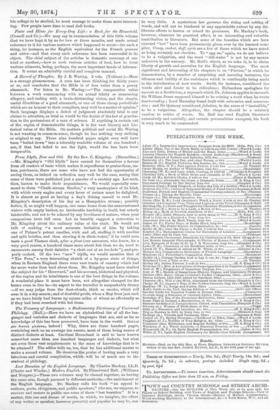Prose Idylls, New and Old. By the Rev. C. Kingsley.
(Macmillan.) —Mr. Kingsley's " Old Idylls " have earned for themselves a favour from all readers of taste which makes it superfluous to praise them, un- less, perchance, there are some who have not had the opportunity of seeing them, as indeed on reflection may well be the case, seeing that some of them were published just a quarter of a century ago. Let such, then, hasten to make their acquaintance. We would especially com- mend to them "Chalk-stream Studies," a very masterpiece of its kind, with which every angler and every lover of nature must be delighted. It is almost as good as having a day's fishing oneself to read Mr. IKingsley's description of his day on a Hampshire stream ; possibly better, if, as might well happen, one came home from the unaccustomed waters with empty basket, no intolerable hardship in itself, but utterly intolerable, and not to be solaced by any loveliness of nature, when your companions have full ones. Let us humbly suggest a correction to Mr. Kingsley about the culinary value of the chub. He would not talk of making " a most accurate imitation of him by taking one of Palmer's patent candles, wick and all, stuffing it with needles and split bristles, and then stewing it in ditch-water," if he could once taste a good Thames chub, after a frost (our ancestors, who knew, for a very good reason, a hundred times more about fish than we do, used to enumerate among their dainties "a chub out of an ice-hole "), and pro- perly cooked. Of the two "new s' idylls, we would mention that of "The Fens," a very interesting sketch of a by-gone state of things, when in Eastern England there were vast tracts of country which had far more water than land about them. Mr. Kingsley must have studied the subject for his " Hereward," and his account, historical and physical, of the region and its inhabitants is one of the best things in the volume. A wonderful place it must have been, not altogether changed for the better even to live in—its aspect to the traveller is unspeakably dreary —if we may judge from the dust-clouds, thick as smoke, which roll over it in a dry season; and of doubtful profit, when a May frost just such as we have lately had burns up square miles of wheat as effectually as if they had been scorched with hot irons.


































 Previous page
Previous page